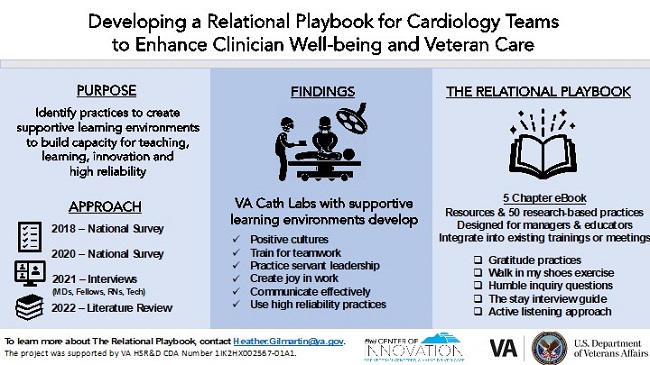Takeaway: The Relational Playbook for Cardiology Teams will assist managers, educators, and clinical staff in assessing and improving relationships and communication. The Playbook has been registered as an "invention" with the VA Technology Transfer Office due to its potential for commercialization to benefit Veterans and the American public.
The Veterans Health Administration (VHA) is undergoing a transformational modernization at a scale and scope not undertaken since the 1940s. At the core of this transformation is a cultural shift toward becoming a high reliability organization (HRO). An HRO experiences fewer than anticipated accidents or events of harm to patients despite operating in highly complex, high-risk environments where even small errors can lead to tragic results (FORUM, 2020). Contributing to this over-arching mission is the development of a Relational Playbook for Cardiology Teams.
Supported by an HSR&D Career Development Award (CDA), Heather Gilmartin, PhD, NP, part of HSR&D's Denver/Seattle Center of Innovation for Veteran-Centered and Value-Driven Care, sought to shift the current paradigm for learning from standardized procedurally-focused educational methods to one that provides teams with HRO and Learning Health System guided resources and interventions. The goal is to include relationship, communication, and teamwork content in meetings and trainings to help change VA’s culture toward learning and high reliability to enhance Veteran care. Dr. Gilmartin partnered with the VA National Cardiology Program, the VA Clinical Assessment, Reporting and Tracking (CART) program, and VA cardiac catheterization laboratories (cath labs) for this research.
Cath labs are a really strange place to work. The skill set here is really unlike anywhere else in the hospital. The level of technical responsibility is immense. Physicians depend on us to be doing things and having a level of clinical competence that I don't think really transfers to any other area of the hospital. —VA Cath Lab Nurse
Supportive learning environments build capabilities for teaching and learning, empower teams to safely try new things, and adopt highly reliable work practices (e.g., debriefs). However, during her research, Dr. Gilmartin noted that guidance on how to develop high-quality relationships and communication and create supportive learning environments was universally lacking. To fill this gap, she surveyed VA cath lab staff in 2018 and 2020, interviewed cath lab clinicians and managers, and reviewed the literature to gather best practices. The information gleaned from these sources led to the development of the Relational Playbook. The Playbook is a five-chapter eBook that includes resources and 50 research-based interventions organized into five interconnected chapters:

The Playbook is different than existing workshops, books, or toolkits in the following ways:
The Playbook will assist managers, educators, and clinical staff in assessing and improving relationships, communication and cultivate supportive learning environments and has been registered as an "invention" with the VA Technology Transfer Office due to its potential for commercialization to benefit Veterans and the American public.
Implications
The Relational Playbook is designed to help move teams from good to great, while ensuring patient safety, improving employee engagement, and lowering burnout and turnover.
Next Steps
To establish the Relational Playbook as a feasible and acceptable tool, Dr. Gilmartin will be:
Partners
VA Technology Transfer, VA National Cardiology Program Office, VA Clinical Assessment, Reporting and Tracking (CART) Program, and the VA Office of Nursing Services (ONS).
Publications
Gilmartin H, Hess E, Mueller C, et al. A pilot study to assess the learning environment and use of reliability enhancing work practices in VHA cardiac catheterization laboratories. Learning Health Systems. April 2021;5(2):e10227.
Gilmartin H, Plomondon M, Mueller C, et al. The impacts of COVID-19 on Veterans Affairs catheterization laboratory staff during the first months of the U.S. response. Journal of Cardiovascular Nursing. Nov-Dec 2021;36(6):595-598.
Gilmartin H, Hess E, Mueller C, et al. Learning environments, reliability enhancing work practices, employee engagement, and safety climate in VA cardiac catheterization laboratories. Health Services Research. April 2022;57(2):385-391.
Podcast
VA HSR&D Investigator Insights. Gilmartin H. Building Resiliency, Quality and Retention into VA Cardiac Catheterization Laboratories. April 29, 2022.